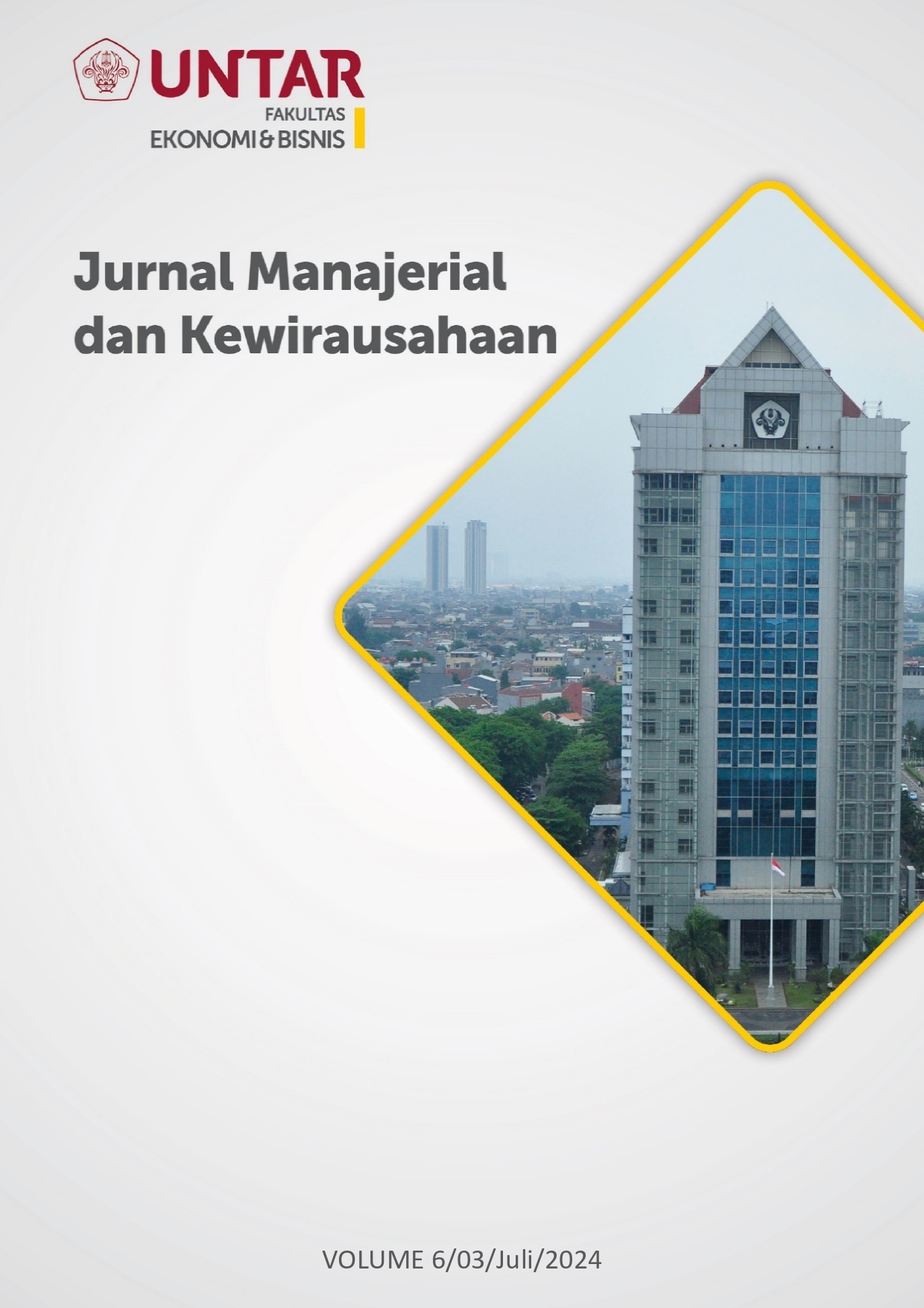Menggali Faktor-Faktor yang Mendorong Repurchase Intention pada Platform Shopee Food
Main Article Content
Abstract
This research is aimed at addressing the challenges arising from the advances in technology and the pervasive trend of digitization, particularly in the rapidly growing use of online food delivery platforms such as Shopee Food, which has become an inseparable part of daily life amid the expanding and intricate digital era. Thus, this study specifically focuses on conducting an in-depth analysis of the critical factors, such as perceived security, trust, and perceived ease of use, that substantially influence customers' intention to make repeat purchases on the Shopee Food platform, particularly in the JABODETABEK region chosen as the scope of this research. The sample for this study comprises 206 respondents with experience in transacting on the Shopee Food platform, and the data processing method employs the SMART-PLS 4.0 technique as the primary approach to evaluating and analyzing the relationships between the tested variables. By detailing and elaborating on each element in this research, it was found that perceived security, trust, and perceived ease of use significantly and positively impact the repurchase intention of Shopee Food customers in the JABODETABEK region, providing valuable insights into consumer behavior when using online food delivery services in this era.
Article Details
Section

This work is licensed under a Creative Commons Attribution-NonCommercial-ShareAlike 4.0 International License.
This work is licensed under a Jurnal Muara Ilmu Ekonomi dan Bisnis Creative Commons Attribution-ShareAlike 4.0 International License.,/p>
References
APJII. (2023). Survei APJII Pengguna Internet di,yang sebesar 275.773.901 jiwa. https://apjii.or.id/berita/d/survei-apjii-pengguna-internet-di-indonesia-tembus-215-juta-orang. (Accessed: 1 December 2023).
Budi, Y. S., Nofirda, F. A., & Hardilawati, W. L. (2023). The Influence of Web Design Quality, Perceived Ease of Use and Trust on Purchase Intention: A Case Study on Lazada. International Journal of Management and Business Applied, 2(2), 126-140. https://doi.org/10.54099/ijmba.v2i2.678
Damayanti, V. (2019). Pengaruh Perceived Usefulness dan Perceived Ease of Use terhadap Purchase Intention Melalui Brand Image sebagai Variabel Intervening pada Mahasiswa UST Yogyakarta Pengguna Shopee. Jurnal Ilmiah Ekonomi dan Bisnis, 16(2), 99–109. https://doi.org/10.31849/jieb.v16i2.2317
Eid, M. I. (2011). Determinants of e-commerce customer satisfaction, trust, and loyalty in Saudi Arabia. Journal of electronic commerce research, 12(1), 78.
Garcia, J. M., Freire, O. B. D. L., Santos, E. B. A., & Andrade, J. (2020). Factors affecting satisfaction and loyalty to online group buying. Revista de Gestao, 27(3), 211–228. https://doi.org/10.1108/REGE-02-2018-0037
Guo, X., Ling, K. C., & Liu, M. (2012). Evaluating factors influencing consumer satisfaction towards online shopping in China. Asian social science, 8(13), 40. http://dx.doi.org/10.5539/ass.v8n13p40
Hair, J. F., Hult, G. T. M., Ringle, C. M., Sarstedt, M., Danks, N. P., & Ray, S. (2022). Partial least squares structural equation modeling (PLS-SEM) Using R. In Practical Assessment, Research and Evaluation (Vol. 21, Issue 1).
Henseler, J., Ringle, C. M., & Sarstedt, M. (2015). A new criterion for assessing discriminant validity in variance-based structural equation modeling. Journal of the Academy of Marketing Science, 43(1), 115–135. https://doi.org/10.1007/s11747-014-0403-8
Keni, K. (2020). How Perceived Usefulness and Perceived Ease of Use Affecting Intent to Repurchase?. Jurnal Manajemen, 24(3), 481-496 https://doi.org/10.24912/jm.v24i3.680
Lestari V. T., & Ellyawati J. (2019). Effect of e-service quality on repurchase intention: Testing the role of e-satisfaction as mediator variable. International Journal of Innovative Technology and Exploring Engineering (IJITEE), 8(7), 158–162.
Malhotra. N. K. (2020). Essentials of marketing Research. Pearson Education Limited.
Miao, M., Jalees, T., Zaman, S. I., Khan, S., Hanif, N. ul A., & Javed, M. K. (2022). The influence of e-customer satisfaction, e-trust and perceived value on consumer’s repurchase intention in B2C e-commerce segment. Asia Pacific Journal of Marketing and Logistics, 34(10), 2184–2206. https://doi.org/10.1108/APJML-03-2021-0221
Nadeem, M. A., Liu, Z., Pitafi, A. H., Younis, A., & Xu, Y. (2020). Investigating the repurchase intention of Bitcoin: empirical evidence from China. Data Technologies and Applications, 54(5), 625–642. https://doi.org/10.1108/DTA-10-2019-0182
Priansa, D. J. (2017). Komunikasi pemasaran terpadu pada era media sosial. Bandung: CV Pustaka Setia, 358.
Rizi, Y. A., Dharma, F., Amelia, Y., & Prasetyo, T. J. (2023). Factors Affecting Trust and Interest in Transactions by Indonesian MSME Sellers in e-Commerce. Journal of Indonesian Economy and Business, 38(1), 19–42. https://doi.org/10.22146/jieb.v38i1.4394
Trivedi, S. K., & Yadav, M. (2018). Predicting online repurchase intentions with e-satisfaction as mediator: a study on Gen Y. VINE Journal of Information and Knowledge Management Systems, 48(3), 427–447. https://doi.org/10.1108/VJIKMS-10-2017-0066
We are social (2023). The Changing World of Digital In 2023. Retrieved from https://wearesocial.com/id/blog/2023/01/the-changing-world-of-digital-in-2023-2/ (Accessed: 1 December 2023).
Wilson, N. (2019). The impact of perceived usefulness and perceived ease-of-use toward repurchase intention in the Indonesian e-commerce industry. Jurnal Manajemen Indonesia, 19(3), 241. https://doi.org/10.25124/jmi.v19i3.2412
Wilson, N., Alvita, M., & Wibisono, J. (2021). The effect of perceived ease of use and perceived security toward satisfaction and repurchase intention. Jurnal Muara Ilmu Ekonomi Dan Bisnis, 5(1), 145. https://doi.org/10.24912/jmieb.v5i1.10489
Yanico, Y. & Keni, K. (2021). Perceived Ease of Use, Trust, dan Customer Satisfaction sebagai Prediktor terhadap Repurchase Intention. Jurnal Manajemen Maranatha, 20(2), 107–118. https://doi.org/10.28932/jmm.v20i2.3244
Zhang, R., Jun, M., & Palacios, S. (2023). M-shopping service quality dimensions and their effects on customer trust and loyalty: An empirical study. International Journal of Quality & Reliability Management, 40(1), 169-191. https://doi.org/10.1108/IJQRM-11-2020-0374

